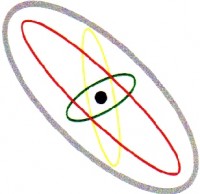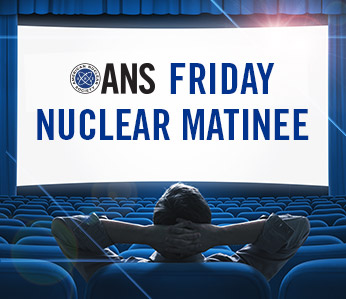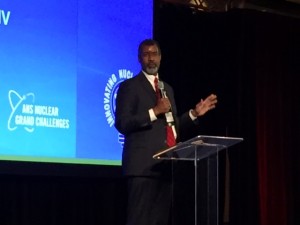Please, John Oliver, Please Talk To A Real Nuclear Scientist
On Sunday night, the brilliant comedic satirist, John Oliver, presented a very funny, if basically wrong, segment on nuclear waste.
-3 2x1.jpg)
A message from Curtiss-Wright
High-Temperature neutron flux detectors for Generation IV reactors and SMRs
On Sunday night, the brilliant comedic satirist, John Oliver, presented a very funny, if basically wrong, segment on nuclear waste.
(Third in a series of videos recorded at the ANS Annual Meeting, June 2017 in San Francisco)
The next few years mark a turning point for commercial nuclear power in the United States, because after that there will be only a decade until 2030. That is when some fraction of the nation's aging nuclear fleet built in the 1970s and 1980s is expected be decommissioned when renewed licenses run out. Nuclear plants in the United States originally were given 40-year licenses and most have been renewed, and those expire in the 2030-2050 time range. Of course, this also assumes some plants cannot attain a second license renewal. If construction of new reactor units is not started soon, the existing plants could be shuttered before any new units come online. That is based on the 15-year construction timeline it takes for new nuclear construction in the U.S. This will have the unfortunate impact of leaving the nation without some of its reliable, clean, base-load energy that the country has relied on to provide 20-30 percent of its electrical generating capacity for the past 40 years.
The Democratic People's Republic of Korea (DPRK), often referred to as North Korea, is testing ballistic missiles capable of reaching California with a miniaturized atomic warhead. Neither component is fully developed yet.
In June, Bob Coward became the 63rd president of the American Nuclear Society. Watch this short introduction video where Bob talks about his career, his thoughts on the future of nuclear, and how it fits into the needs of the world.
Imagine you've walked into a restaurant and are at the counter to order. You notice, but think nothing of the fact, that there appears to be two order windows and possibly two separate kitchens. You order a cheeseburger, expecting American cheese and ketchup (among other things), but what you get has mustard and Swiss. When you make a comment about it, you're told that "cheese is cheese" and nothing more is said. Two items-mustard and Swiss-weren't ordered, but one was-a cheeseburger-and so you eat it.
Editors note: Today's video is second in a special series filmed in June at the American Nuclear Society's Annual Meeting held in San Francisco, Calif. this past June.
Do you know of a science journalist whose writing stands out in capturing your interest? This year, the American Nuclear Society (ANS) Communications Committee is launching the Darlene Schmidt Science News Award named for one of ANS's most dedicated and beloved employees from the 1980s to the early '90s. The purpose of this award is to acknowledge journalists and reporters who provide accurate, innovative, and well-researched science coverage for the general public. Being able to effectively communicate scientific ideas and the merits of nuclear energy to the general public is vital to the success of ANS. To encourage accurate scientific journalism, this award will acknowledge a writer who embodies these important characteristics.
Yesterday, a rapid series of events led to the announcement that the expansion of the V. C. Summer nuclear plant, comprising two AP1000 units (Units 2 and 3), would be cancelled. Details and some of the developments leading to the decision are herein discussed.
 The last half of the 1950s was a time of great promise for the concept of atomic-powered commercial ships. The idea was given real political momentum (which it very much needed) in 1955 when President Eisenhower formally proposed construction of such a ship by the United States. In July 1956, Congress passed Public Law 848, authorizing the actual engineering and construction of the ship.
The last half of the 1950s was a time of great promise for the concept of atomic-powered commercial ships. The idea was given real political momentum (which it very much needed) in 1955 when President Eisenhower formally proposed construction of such a ship by the United States. In July 1956, Congress passed Public Law 848, authorizing the actual engineering and construction of the ship.
(This post is the first of a series showing presentations given at the American Nuclear Society's 2017 Annual Meeting, held in San Francisco in June.)

Our ANS Nuclear Cafe "Friday Nuclear Matinee" feature this week is a brand new video produced by the IAEA (International Atomic Energy Agency) entitled "What is the Future of Nuclear Energy?" This fact-filled three-minute video is a good primer for the future of nuclear power. We hope you enjoy it!
Whenever I turn on the news and hear how America should generate its electric power, hardly any "expert" cites nuclear energy. Energy discussions are especially prominent now, since the United States decided to pull out of the Paris climate agreement. What is so striking to me is that nuclear is almost never talked about, and when it is, it's normally an afterthought to other sources of energy. America's largest source of clean power is nuclear, which makes up roughly 20 percent of all power generation, and it should take a more prominent role. This got me wondering, why isn't nuclear talked about more as a solution? As a nuclear engineer, my opinion, albeit a bit biased, is that we need nuclear energy in our energy mix.
Reports out of China emerged earlier this week that Sanmen Unit 1, the first Westinghouse AP1000 unit expected to start up, had "been commissioned." These reports quoted an official speaking at a professional conference.
I am the new student director for the American Nuclear Society. I will be representing students on the ANS Board of Directors for the next two years.
More than the usual number of nuclear energy-related news items have come to the fore this week, so we'll touch on each significant development and provide links for further reading.
On the wall in my office hangs a picture of what appears to be an ordinary fellow. His short, dark hair is combed back in typical 1960s fashion, and the spectacles, coat and tie he wears give him a decidedly establishment look.
Science hasn't always been his strongest suit, but he has grown up to be a businessman who, despite his lack of diplomatic conduct, has managed to successfully negotiate the most challenging deal of all- becoming president of the largest economy in the world. Why then, is this businessman's decision to pull out of an environment deal met with harsh criticism and distrust?
In a stunning but not wholly unexpected move, newly elected South Korean president Moon Jae-In announced during a ceremony marking the final shutdown of Kori Unit 1 that future nuclear power plants in South Korea will be cancelled and that the country will begin to shift toward renewables for its future energy needs-backed by natural gas.

OECD Nuclear Energy Agency Director-General Bill Magwood speaks at the ANS 2017 Annual Meeting. Photo credit: Tari Marshall.
Attendees of the 2017 American Nuclear Society Annual Meeting were fortunate to hear an address by William Magwood, the former NRC Commissioner. Magwood is currently the Director-General of the Nuclear Energy Agency (NEA) of the OECD. He addressed the ANS members on the ANS Grand Challenges developed under the leadership of (now immediate past-President) Andy Klein.